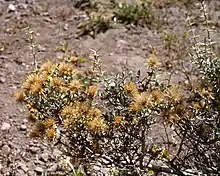Barnadesioideae
Barnadesioideae is a subfamily of flowering plants in the aster family, Asteraceae. It comprises a single tribe, the Barnadesieae. The subfamily is endemic to South America. Molecular evidence suggests it is a basal clade within the family,[1][2] and it is monophyletic.[3]
| Barnadesioideae | |
|---|---|
 | |
| Chuquiraga oppositifolia | |
| Scientific classification | |
| Kingdom: | Plantae |
| Clade: | Tracheophytes |
| Clade: | Angiosperms |
| Clade: | Eudicots |
| Clade: | Asterids |
| Order: | Asterales |
| Family: | Asteraceae |
| Subfamily: | Barnadesioideae K.Bremer & R.K.Jansen |
| Tribe: | Barnadesieae D.Don |
| Genera | |
|
9, see text | |
The subfamily includes species of annual and perennial herbs, shrubs, and trees up to 30 meters tall. Most are likely pollinated by hummingbirds.[3]
Phylogeny
Genetic analysis has included increasing numbers of taxa and involved a growing number of genes. The relationships of the genus Schlechtendalia could so far not be resolved. The following tree reflects the current scientific insights and Schlechtendalia can be found in two possible positions.[3]
| |||||||||||||||||||||||||||||||||||||||||||||||||||||||||||||||||||||||||||||||||||||
References
| Wikimedia Commons has media related to Barnadesioideae. |
- Urtubey, E. and T. F. Stuessy. (2001). New hypotheses of phylogenetic relationships in Barnadesioideae (Asteraceae) based on morphology. Taxon 50(4) 1043–66.
- Timme, R. E., et al. (2007). A comparative analysis of the Lactuca and Helianthus (Asteraceae) plastid genomes: identification of divergent regions and categorization of shared repeats. American Journal of Botany 94(3) 302–12.
- Gruenstaeudl, Michael; Urtubey, Estrella; Jansen, Robert K.; Samuel, Rosabelle; Barfuss, Michael H.J.; Stuessy, Tod F. (2009). "Phylogeny of Barnadesioideae (Asteraceae) inferred from DNA sequence data and morphology". Molecular Phylogenetics and Evolution. 51 (3): 572–87. doi:10.1016/j.ympev.2009.01.023. PMID 19264147.